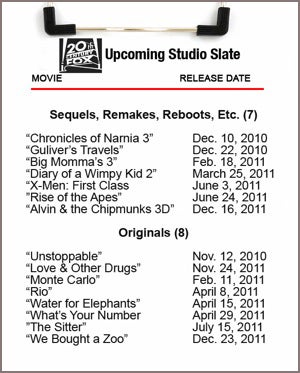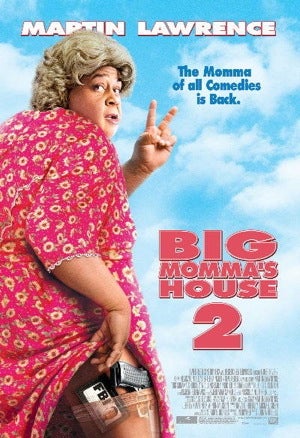A decade ago Fox optioned a Wired magazine story about cyber warfare and commissioned “Enemy of the State” screenwriter David Marconi to create an original movie treatment called “WW3.com.”
But it didn’t stay original. By the time it was released, the project had become part of Bruce Willis' John McClane franchise, 2007’s “Live Free or Die Hard.”
It's still a familiar scenario in Hollywood. But more so than other major studios, Twentieth Century Fox now stands out as a place where sequels, remakes and reboots dominate the production calendar.
These days the studio's penchant for sticking with familiar territory has executives and talent complaining of creative stagnation at one of Hollywood’s most important movie-production hubs.
See slideshow: "Originals vs. Rehashes, Studio by Studio."
“Fox is more into brand management than generating creative content,” noted one producer of a tentpole franchise at another major studio. “Their goal is to provide themselves with iterations they feel that they can publish every 18 months and recoup profits from them from all their methods of exploitation.”
With seven of the Fox’s next 15 films through 2011 either sequels or adaptations of well-known titles like the December release “Gulliver’s Travels," the studio has established itself in the creative community as among the most risk-averse of the majors.
(Disney and Paramount currently have similar ratios. But the management team at Disney has been upended in the past year, so a fair assessment needs more time. Paramount could justifiably be accused of the same dynamic – or lack thereof – with the added worry that the studio has reduced its production overall. Meanwhile, Sony and Universal have by far the most original productions on their slate.) 
Fox does have original concepts on order. Among those coming in 2011 are the animated feature “Rio,” Selena Gomez rom-com “Monte Carlo” and Jonah Hill comedy “The Sitter.”
But after Fox Filmed Entertainment co-chairman Jim Gianopulos recently presented the studio’s upcoming slate to a major Hollywood talent agency, one a partner at a leading talent agency said he was taken aback at a recent studio briefing by a line-up that included a third appearance by Martin Lawrence in his “Big Momma” latex suit, a second “Diary of a Wimpy Kid,” a fourth “X-Men” installment, a third “Alvin and the Chipmunks” movie, a seventh “Planet of the Apes” film and yet another “Die Hard.”
All that, and a fourth “Ice Age” and a seventh “Alien” installment are also coming down the pike.
TheWrap interviewed more than a dozen producers and executives, and because of the sensitivity of the subject, none agreed to speak on the record.
“I went down that same list,” noted a lit agent for a rival firm who covers Fox. “It was remake, remake, sequel, sequel. It was very short on original ideas.”
He added: “Fox is at the end of the spectrum in that it makes the least interesting movies.”
While declining to comment specifically for this article, Fox executives defend the studio’s creative choices, pointing to the recent purchase of an original Tim Burton property, “Abraham Lincoln: Vampire Hunter,” and a greenlight for writer-director Cameron Crowe’s “We Bought a Zoo.”
Fox executives also note the contribution of specialty division Fox Searchlight, which produces a steady stream of films based on original concepts into the company's distribution pipeline.
Fox is far from alone among major studios in its reliance on properties with established marketing hooks.
For example, Warner Bros. has six sequels lined up through 2011, including a fifth “Final Destination” movie. Universal, by comparison has 12 originals upcoming, to two sequels/remakes, and Sony has 18 originals to three sequels/remakes.
But Warner also has far more films than Fox on its slate based on original concepts — more than a dozen through next year — and is riding high on the industry clout associated with Chris Nolan’s original summer hit “Inception.”
From the perspective of corporate balance sheets, it’s difficult to assail the Fox programming strategy.
For News Corp’s fiscal 2010 which ended June 30, the Filmed Entertainment division enjoyed record operating income of $1.3 billion, driven primarily by the original-story mega-hit “Avatar” — but also by “Alvin and the Chipmunks: The Squeaquel.”
But with only one movie (“Date Night”) released in calendar year 2010 registering in the top 20 in terms of domestic gross, that fiscal 2010 number will be difficult to match.
Fox had an inauspicious summer that included derivative titles like “The A-Team” and “Marmaduke.” All this means that Fox’s upcoming slate is getting a fair amount of critical scrutiny these days.
So why the creative trough?
Fox has long had a reputation for being among the toughest negotiators in Hollywood — which executives wear as a badge of honor. Studio executives insist, in fact, that this dynamic is part of what a responsible, publicly held company has to do to maintain profitable business models for its films.
And holding the line on negative costs and leveraging established intellectual property does deliver wins — such as the July release “Predators,” which has recouped $125.4 million worldwide so far on a production budget of only around $40 million.
But in a competitive environment, frugal doesn’t always win out when it comes to wooing top creative talent. Just the opposite: It tends to discourage filmmaking talent from bringing fresh ideas to the studio.
“In this environment, everybody is open to working with everybody,” said the literary agent. “But all things being equal, I think most directors would prefer working for Sony or DreamWorks over Fox. They’re all over the process.”
Added one producer: “Fox has a very specific target, and that’s to cheaply cast things that are branded. For guys like me, it’s hard to crack that code.”
Editor's note: We have deleted an erroneous reference to a meeting between Fox co-chairman Jim Gianopulos and a talent agency partner.





